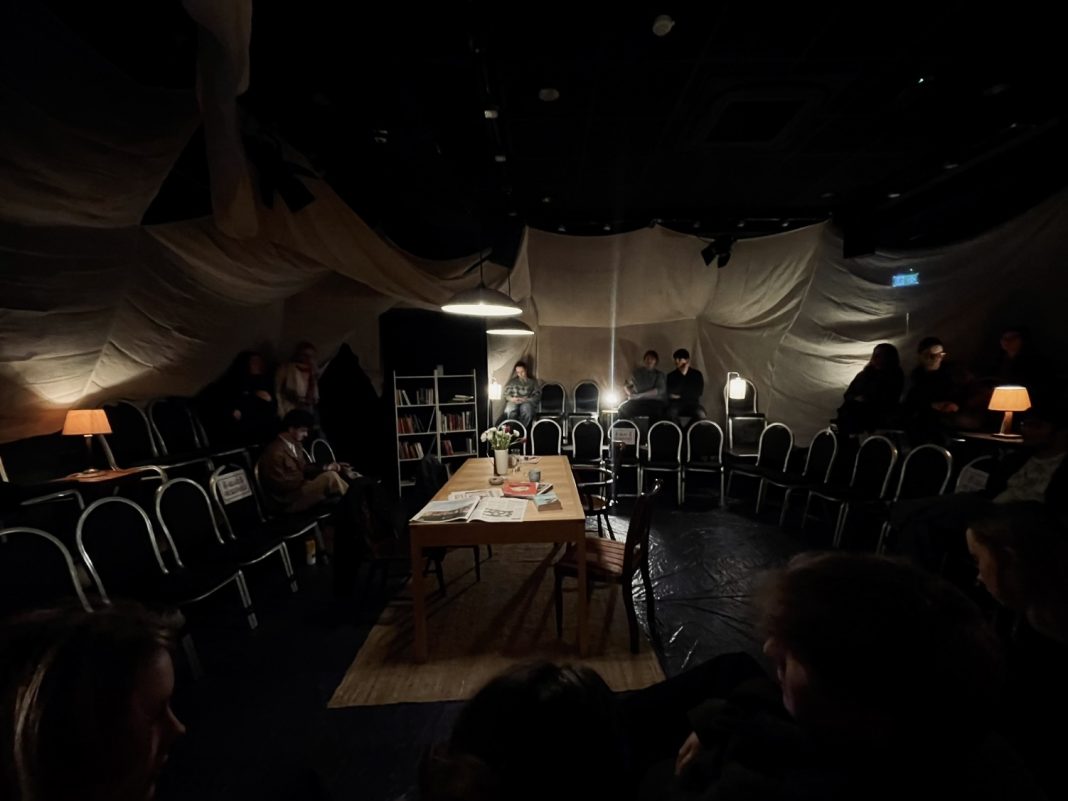Clarendon Productions brings The Goat, or Who is Sylvia? (Edward Albee) to the Michael Pilch studio, painfully, humorously, and soulfully. Seated in the round, the audience is gifted a fly-on-the-wall experience in the exclusivity of a family dining room. It feels intrusive to be here, pressed up against bedsheets hung up around the studio, cloaking both actor and audience in the private affair.
The set (Lucas Angeli, Vita Hamilton, Fraser Gilliat, George Vyvyan) feels distantly familiar. Upon the wooden dining table at the centre, newspapers and books are strewn carelessly, and a vase of seasonal flowers is displayed proudly alongside half-enjoyed cups of tea, glasses of water, and a small dish of peanuts. Warm lampshades on side-tables punctuate the rows of audience, and a couple of bookshelves neighbour the doors.
Honor Thompson plays Stevie, an affluent suburban wife. Sitting amidst the audience in the comfort of her tastefully curated home, she lights up upon the entrance of her husband, Martin (Rob Wolfreys). They joke and they touch, effortless and unsparing in their affections. Wolfreys portrays Martin, a 50 year-old architect at the summit of his career, concealing a hauntingly transgressive secret. He has fallen in love with a goat, Sylvia, the partner of his emotional and sexual affair.
The play begins with Martin struggling with his memory in conversation with his wife. Shortly after, the scene introduces the family’s oldest friend, Ross (Luke Bannister), who arrives to interview Martin on his latest success. Here, Martin wrestles with distractedness and verbal incoherence, much to the frustration of his friend, and is soon pressured to reveal the source of his anxiety: he is sleeping with a goat. Bannister consistently and impressively harmonises stunned disgust with fierce loyalty in his performance of Ross; what begins with an apparent sentiment of pride in being the one in whom Martin confides, quickly transforms into stark repulsion and despair, his ‘head-in-hands’ disposition enmeshed skilfully with ‘tongue-in-cheek’ farce.
While Martin’s memory and emotional wellbeing seem spotted, his demeanour remains largely unfazed. There’s some sort of honest assurance coursing through his despondency, which Wolfreys conveys impeccably. His speech is erratic and disjointed; it’s annoying and worrying, simultaneously igniting and disrupting the fast pace of the performance. He shares confessionally with a kind of earnest retrieval that is truly rare to see on stage: you’re moved to sympathy, however disturbing the substance of his story.
Thompson’s commitment to Albee’s dry, absurdist humour, while equally breaking our hearts with candid vulnerability, is sincerely remarkable. Highly intelligent and admirably composed, Stevie is beautifully embodied by Thompson’s subtle physicality and tentativeness. Her flair for storytelling, beyond the story at hand, through something even as delicate as the way that she looks at her husband, enriches the performance entirely. Unthinkable shame meets once-pride; in one breath, “you goat-fucker, you love of my life” is delivered as an outcry and felt like a knife. Thompson’s portrayal of Stevie is arresting and unforgettable.
Euan Elliott offers an exceptional performance of Billy, their 17 year-old son. Wide-eyed, wounded, bewildered, and thoroughly unsettled, Elliott perfectly captures the nature of this mournful and confused teenager, whose world is destroyed at the cusp of his making sense of it. He deftly balances instances of appalled outburst with quiet resignation: the indignant, forceful voice of an almost-man contrasted shatteringly with the scared confessions of a little kid. There is an endearing clumsiness to his activity, from his startled posture, to his feigned bravery in confrontation, to the way he lingers awkwardly by the door.
For me, underpinning the play were the occurrences which happened only a couple of times, easily missable given the pace of the performance, yet strikingly essential. In the middle of, for example, a shouting match between husband and wife, of tumultuous discovery or crippling revelation, there would be on occasion a moment that feels like both characters step outside of staring at the devastation to ‘see’ one another. “Very good, by the way”, says Martin as his wife cleverly finishes a singular sentence that shreds him to pieces. Neither pausing to register his comment, nor exploding in enraged response, Stevie replies simply: “Thanks”. Pedantic language games and snide grammar corrections litter the play’s dialogue. We see that their marriage has worked seamlessly for 22 years because what goes beyond love is reciprocal knowledge and timeless playfulness. For Wolfreys and Thompson to convey a kind of intimate mutuality that is so instinctive and unaffected, and, as an audience member, to watch two people on stage genuinely know one another in the purest and most transparent form, even despite the majority of the play navigating the ruin of this knowledge, is extraordinary. It feels reductive to call it ‘chemistry’.
Vita Hamilton’s debut directorial project has blown us all away, with her careful balance of raw, absurdist humour and salient honesty. Hamilton’s crafting of the play is masterful: skin-to-skin and suffocating, yet eliciting quiet relief.
The show feels like a drawn-out heartbreak, intermittently broken by eruptions of incredulous laughter. You burst out laughing while the tears are still streaming down your face. Quick, astute dialogue and fluid, familial movement traverses erotic struggle, personal dysfunction, and relational carnage. The Goat leaves a lasting impression. A catastrophe of the home and the heart.


